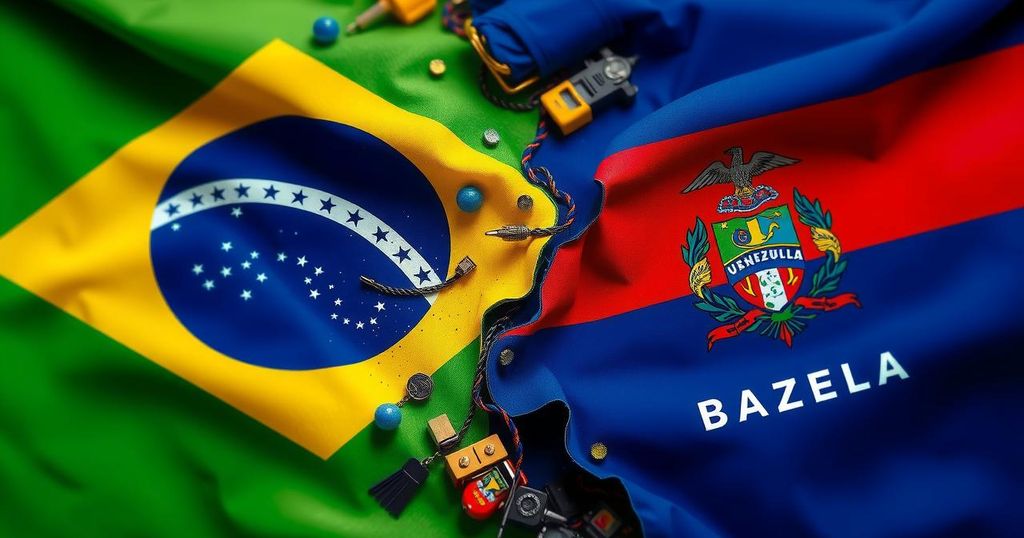Brazil has publicly criticized Venezuela for escalating tensions and adopting an offensive tone against Brazilian officials. The remarks come amidst growing criticism from Venezuela directed at Brazil’s government and its elected officials related to foreign policy and electoral issues. The diplomatic dispute has intensified following Brazil’s non-support of Venezuela’s BRICS application, leading to further backlash from the Venezuelan government.
Brazil’s government has publicly addressed rising tensions with Venezuela, expressing surprise at what it describes as an “offensive tone” from Venezuelan officials. The situation escalated as Venezuela intensified its criticism of Brazil’s foreign policy and even targeted President Luiz Inácio Lula da Silva, a long-time ally. The Brazilian Foreign Ministry remarked that Venezuela’s choice of personal attacks and rhetorical aggression diverges from the respectful manner in which Brazil engages with its neighboring country. This wave of criticism from Venezuela follows comments made by a presidential adviser in Brazil, stating that Brazil did not support Venezuela’s application to join the BRICS bloc at a recent summit in Russia. This has further strained relations already affected by disputes surrounding Venezuela’s presidential election results. The Venezuelan Foreign Ministry recently summoned Brazil’s chargé d’affaires in Venezuela to convey its strong disapproval of Brazilian officials’ statements. They accused Brazil’s former foreign minister, Celso Amorim, of being an agent of American imperialism by criticizing Venezuela’s democratic processes. Initially, Brazil refrained from commenting to de-escalate tensions, but this approach changed after provocative imagery shared by Venezuela’s police suggested that meddling with Venezuela would lead to consequences. In response, Brazil emphasized its commitment to non-intervention and respect for sovereignty, referencing its involvement in the 2023 Barbados Agreements aimed at regulating Venezuela’s elections. Amorim also spoke on the discomfort between the two nations, attributing it to the Maduro government’s refusal to fully disclose election results, indicating that the potential for improved diplomatic relations hinges on Venezuela’s actions. The Brazilian government has pushed back against claims by Venezuela’s electoral authorities, who cite technical issues as the reason for not publishing full results, alongside allegations from the opposition claiming a landslide victory against Maduro. Efforts by left-leaning Latin American leaders to mediate the electoral situation ultimately failed, allowing Maduro to consolidate power further. Brazil’s opposition to Venezuela’s BRICS inclusion is underscored by a belief that potential members should possess substantial influence to fairly represent the region. In turn, Venezuela condemned Brazil’s stance as irrational and compared it to U.S. economic sanctions.
The relationship between Brazil and Venezuela has been strained due to a series of political tensions and differing views on electoral integrity and foreign policy. Brazil’s recent comments on Venezuela’s exclusion from the BRICS summit and its concerns regarding the Venezuelan electoral process have heightened diplomatic rifts. The political atmosphere in Venezuela has been under scrutiny, especially following the July presidential election, characterized by claims of irregularities and lack of transparency. Additionally, Venezuela’s aggressive responses to Brazilian statements have led to escalating criticisms, further complicating the efforts of both nations to maintain a cordial diplomatic relationship.
In conclusion, the diplomatic dispute between Brazil and Venezuela highlights the complexities of international relations in South America, particularly around issues of sovereignty, electoral integrity, and regional alliances. Brazil’s Foreign Ministry’s emphasis on respectful dialogue contrasts sharply with Venezuela’s aggressive rhetoric, illustrating the potential for conflict in diplomatic interactions. The current situation underscores the need for constructive communication and resolution mechanisms to address disagreements and promote collaboration between these neighboring nations.
Original Source: abcnews.go.com






